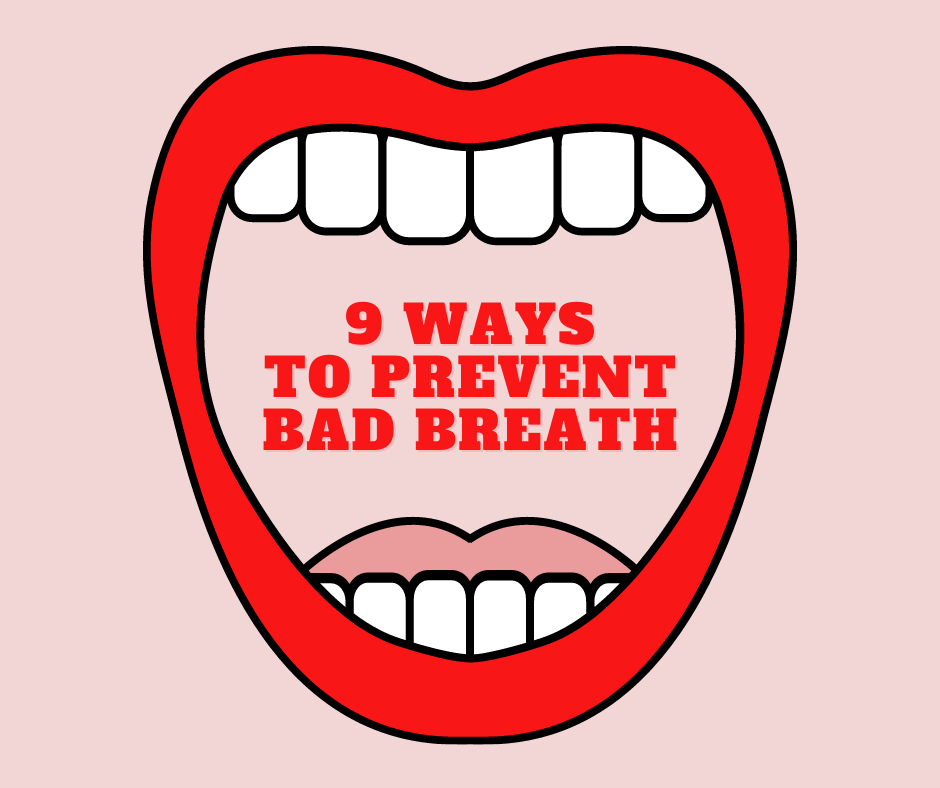Bad breath, also known as halitosis, can be pretty embarrassing. It can lead to social isolation when a person with bad breath refuses to talk to people or socialize due to their dental problems and fear of being judged. Whether it’s poor oral hygiene or certain medical conditions, bad breath can be caused by a multitude of things but you can easily prevent that by doing nine of these solutions:
1. Regularly Brush and Floss
Brushing and flossing your teeth at least twice a day is an essential part of maintaining good oral hygiene which can help prevent bad breath. By brushing, you are removing plaque, bacteria, and food particles from the surface of your teeth and gums. By flossing, you remove food particles and bacteria that may be stuck in between your teeth. This helps to eliminate bacteria that cause bad breath and also prevents tooth decay, gum disease, and other oral health issues.
2. Use Mouthwash
Using an antiseptic mouthwash can help prevent bad breath by killing the bacteria that cause it. A mouthwash can also help freshen breath by neutralizing odors and leaving a pleasant taste in the mouth. It is important to note that while mouthwash can help freshen breath temporarily, it should not replace regular brushing and flossing as it cannot remove plaque and food particles. It’s best to use mouthwash after brushing and flossing as a complementary step in maintaining fresh breath.
3. Scrape Your Tongue
Scraping your tongue can help prevent bad breath by removing bacteria that can accumulate on the surface of your tongue. Using a tongue scraper or a toothbrush to gently scrape your tongue can help remove bacteria and freshen your breath. This simple action can help to remove the white coating that can form on the tongue and eliminate the bacteria that cause bad breath. Make sure to scrape your tongue at least once a day, and be gentle to avoid injury or irritation.
4. Stay Hydrated
Staying hydrated is an important factor in preventing bad breath. Drinking water throughout the day can help keep your mouth hydrated and your breath fresh by promoting the flow of saliva which neutralizes the bacteria that cause bad breath. Saliva also helps to wash away food particles and bacteria that can lead to bad breath. Drinking water also helps to keep the mouth moist and prevent dry mouth, which is a common cause of bad breath. To maintain fresh breath, aim to drink at least 8 glasses of water a day and eat water-rich fruits and vegetables.
5. Refrain From Eating Certain Foods
Certain foods such as garlic and onions can cause bad breath because they contain strong odors that can be released through your breath. Eating these foods can cause your breath to smell bad for several hours after consuming them. Additionally, foods high in sugar and refined carbohydrates can cause bad breath because they can feed the bacteria in your mouth. It’s best to avoid these foods if you want to keep your breath fresh or to brush and floss immediately after consuming them.
6. Chew Gum
Chewing gum can help freshen breath by promoting the flow of saliva which neutralizes the bacteria that cause bad breath. Chewing gum can also help to dislodge food particles that may be stuck in your teeth and gums. Do this for about 20 minutes after eating so you can freshen your breath and keep it fresh for some time.
It’s best to choose sugar-free gum, as sugar can feed the bacteria in your mouth and cause bad breath.
Keep in mind that while gum can freshen breath temporarily, it should not replace regular brushing and flossing as it cannot remove plaque and food particles.
7. Get Regularly Checked Up at the Dentist
Keep in mind that bad breath can be a sign of an underlying health problem, so it’s always best to consult with a dentist if you have persistent bad breath. Indeed, said health problems might not even be purely dental—for example, diabetics frequently have bad breath because of persistent bacteria in their teeth!
So, visit your dentist if your bad breath is starting to worry you. Additionally, visit your dentist regardless just to stay on top of your teeth—from cavities to gum disease to chipped teeth, your dentist can fix that all before they start affecting your breath.
8. Follow a Healthy Diet
Eating a healthy diet can help prevent bad breath. A diet that is rich in fruits and vegetables can help keep your breath fresh. Fruits and vegetables are high in fiber, which helps to scrub the surface of your teeth and gums, removing plaque and bacteria. Additionally, these foods are high in water content and help to hydrate the body which can help prevent dry mouth, a common cause of bad breath.
Eating a balanced diet can also help maintain a healthy weight which can reduce the risk of other health conditions that can contribute to bad breath.
9. Take Advantage of Breath Fresheners
Breath fresheners such as mints, gums, sprays, and lozenges can help freshen breath temporarily. These products contain ingredients that can neutralize bad odors and leave a pleasant taste in the mouth.
They can be useful when you need a quick breath freshener, but it’s important to remember that they are not a substitute for good oral hygiene practices such as brushing, flossing, and regular dental checkups. Long-term use of breath fresheners can also lead to over-dependence on them, rather than addressing the underlying causes of bad breath.
